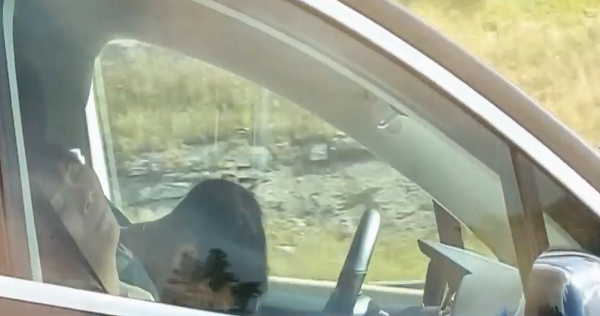
At Waymo, the slogan of the Google self-driving vehicle testing program states, “We’ll leave the lights on for you at home or on the road.”
A pair of feisty Silicon Valley titans ungraciously clashing over the future of the self-driving vehicle market, have taken a provocative and sultry decadent leather backseat to the documented antics of a corporate spy. And pedestrians are compelled again to venture safely within the crosswalks in cities where the controversial, erratic and deadly transportation contraptions are heedlessly unleashed upon the public streets. The live and flagrantly impetuous roadway experiments bordering rival the warped scenario of a computer hacking sociopath contracted by the North Korean government to provide logistical and analytical support as to the growth of the regime’s Winter sports tourism industry built by forced labor and the blood and the life of unfortunate citizens.
The onset of industrial espionage overwhelming the intricate organizational latticework intertwined with the structural integrity of the publicly trade private entity. A curious symbiotic relationship capable of dizzying heights, yet also as fleeting as a house of bar top coasters constructed in a vain attempt to construct a crude tenement as a suitable accompaniment to a drunken interlude between booze and a brazen performance of self-pity. The resident pub alcoholic is the only being remotely competent to register the grievances of the miniature residents pleading on a wavelength of pure despondence, as fate lies in the stability and integrity of the coasters destined for failure. In the convoluted hierarchy of a competitive marketplace balanced on a tedious ledge of cardboard supports, Google and Uber are pitted against each other as #1 seeds in the tournament for complete dominance of the driverless vehicle monopoly bracket, while Tesla and curious of all, Sony, spar for a consolation prize and a niche market share. The race to the top includes a heavy dosage of high stakes spy games, as critical data and priceless designs are tossed back and forth in an interminable game of hot potato.
The saga of self-driving Mad Max style road testing continues to terrorize Americans through employing a listless roster of lounging 30-something male “drivers” operating bulbous wheeled mechanisms and attempting to win the affection of anime princess during crucial highway stretches, and not through the dangerous presence and devious actions of a militarized barbed wire radioactive mullet mutant savages terrorizing the tattered civilized remnants of the planet and cornering what’s left of the global oil supply. Add to the pending the controversy a sustained infusion of espionage, and something has to give. The Mel Gibson Hollywood example of the facts through the lens of spikes and skulls in the harsh wastelands of the future reassuringly calibrates reality isolated within the entertainment realm.
With dismal vehicle performance dominating the headlines involving an intolerable array of gadgetry and terminology, thankfully a tangible human face has emerged to join the egregious narrative of ping-pong accusations and monotonous posturing debating the merits of artificial intelligence replacing the human form planetary custodians of unique and unpredictable wonder.
On Thursday, the individual at the forefront of the scandal rocking the business side of the self-driving vehicles plead guilty to stealing documents from the world’s largest search engine organization and passing along the proprietary data to the behemoth of ride share services, while gaining a lucrative financial fortune and a ceremonial title. In the mold of Philby, Maclean and Burgess, the trifecta of British intelligent agents during the height of the Cold War, who swore their allegiances to the advancement of the Soviet state in helping to dissolve the British empire, Anthony Levandowski allegedly worked as a double agent dealing in corporate secrets along with the accessory of a diminutive laptop. Once faced with 33 counts of charges encompassing the entire spectrum of business espionage within the theater of battle between Waymo, the self-driving brand of Google parent company Alphabet, Inc., and Uber, Levandowski got off virtually scot- free. Thanks to a herculean effort by his legal team orchestrating a masterful performance, the star of the furtive alleyway and backroom deals will face less than three years behind bars. His actions constitute the tip of the iceberg in the Spy vs. spy bumbling and stumbling affairs and series of irreverent blunders under the passive watch of the justice department. The intertwined battle of stealing trade secrets and crossing the legal threshold, has become must see television for a general audience craving drama, humor, and tepid consequences. Why the books smart tech leadership does not hire professionals with proven worldly experience, calls it question the amount of street smarts resounding within the respective board rooms surround the Bay area.

Overthinking defeats the techie-espionage enterprise
In a “no press is bad press scenario”, the public is reinforced by the news as to the current leaderboard in one day mass producing cars, trucks and buses which theoretically do not require the input on controls from a human, and according to the constant reassurances of public relations moguls for the industry, safety numbers will near the impossible when put to the test on the rigorous and challenging roadways. Just tell that line of baloney to the unexpecting victims claimed by technology so overengineered and arrogantly packaged, that billions of years of evolution delicately and diligently shaping the human mind is unceremoniously discounted for AI systems still struggling through the growing pains of infancy and most critically safety.
The jarring collision between tech syndicates jostling for control of robot vehicle manufacturing and the uninspired furtive actions of Levandowski in blatantly discounting the laws governing privileged information, offers an indication to sensible consumers, that the entire thought experiment up to this juncture is a monetary sinkhole of an abomination. While the younger generations utilize the remnants of their imagination in conjuring visions of a head buried in smartphone gaming sessions while blasting 75 mph through the vortex of a city with hands not on the wheel, and only occasionally glancing up with an ADD addled yawn. Entitlement is a dish best served through steaming accommodation with a heaping side of understanding, rather direct actions.
In narrowly avoiding a cataclysmic highway personal nova event, by avoiding corporate security measures and a dodging a hefty settlement of $200 million to Google through bankruptcy, Levandowski facilitated various circuitous subversions in a crafty navigation display worthy of a weasel. The dubious accomplishment certainly could not be mimicked through a MARK-III veritable hover transport drone rated for low earth orbit and calibrated with the factory empathy setting overwhelming the primal guilt shared with the proximal universe by the sole architect of Mercerism. Though the nano-fiber ultra craft is versed in most emergency surgical procedures.
However, the show must go on, as the overzealous tendencies of Silicon Valley leadership attempting to solve practicality issues with unfeasible technology is a production worth the price of admission, especially with the propensity of cast members to swap accountability for account stability, and then some. Prepare the popcorn for the marathon of legal battles on the horizon.
—
This editorial powered by Duckduckgo.com